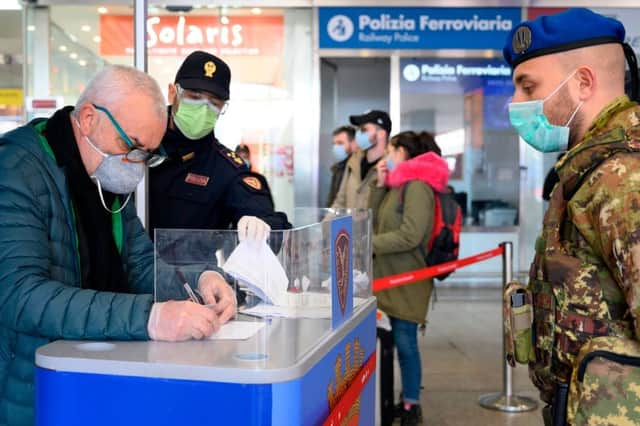All of Italy’s 60 million citizens are in lockdown - here’s why


Italy’s government has imposed a nationwide lockdown in a bid to stem the spread of coronavirus.
The move, which is unprecedented in Italian history, comes as the country battles by far the largest outbreak of the disease in Europe, with more than 7,300 confirmed cases at the time of publishing.
Advertisement
Hide AdAdvertisement
Hide AdOn Monday, Italy’s death toll spiked to 463 from 366 on Sunday.
‘There is no more time’
Announcing the emergency measures, Prime Minister Giuseppe Conte ordered the country’s 60 million strong population to stay in their homes. People must now seek official permission before they are allowed to travel.
“There is no more time,” Conte said in a televised address to the nation.
“The whole of Italy will become a protected zone. We must all give up something for the good of Italy. We have to do it now.”
What are the restrictions?
Advertisement
Hide AdAdvertisement
Hide AdItalians are forbidden from gathering in public while the measures are in place. Bars, cafes, restaurants, and workplaces have been closed.
Schools and universities, which were ordered to be shut last week, will remain closed until early April.
All sporting events have been suspended across the country, which throws the conclusion of the rugby Six Nations Championship into doubt.
No one is allowed to travel, unless given permission by authorities. Officials say people with valid family emergencies, or with jobs that are classed as essential, will still be allowed to travel.
Advertisement
Hide AdAdvertisement
Hide AdAir passengers in and out of Italy will have to prove their travel is unavoidable. Cruise liners and other ships carrying passengers will be turned away from several of the country’s largest ports.
Coronavirus: the facts
What is coronavirus?COVID-19 is a respiratory illness that can affect lungs and airways. It is caused by a virus called coronavirus.
What caused coronavirus?The outbreak started in Wuhan in China in December 2019 and it is thought that the virus, like others of its kind, has come from animals.
How is it spread?As this is such a new illness, experts still aren’t sure how it is spread. But.similar viruses are spread in cough droplets. Therefore covering your nose and mouth when sneezing and coughing, and disposing of used tissues straight away is advised. Viruses like coronavirus cannot live outside the body for very long.
Advertisement
Hide AdAdvertisement
Hide AdWhat are the symptoms?The NHS states that the symptoms are: a dry cough, high temperature and shortness of breath - but these symptoms do not necessarily mean you have the illness. Look out for flu-like symptoms, such as aches and pains, nasal congestion, runny nose and a sore throat. It’s important to remember that some people may become infected but won’t develop any symptoms or feel unwell.
What precautions can be taken?Washing your hands with soap and water thoroughly. The NHS also advises to cover your mouth and nose with a tissue or your sleeve (not your hands) when you cough or sneeze; put used tissues in the bin immediately and try to avoid close contact with people who are unwell. Also avoiding touching eyes, nose and mouth unless your hands are clean.
Should I avoid public places?Most people who feel well can continue to go to work, school and public places and should only stay at home and self isolate if advised by a medical professional or the coronavirus service.
What should I do if I feel unwell?Don’t go to your GP but instead call NHS 111 or look online at the coronavirus service that can tell you if you need medical help and what to do next.
Advertisement
Hide AdAdvertisement
Hide AdWhen to call NHS 111NHS 111 should be used if you feel unwell with coronavirus symptoms, have been in a country with a high risk of coronavirus in the last 14 days or if you have been in close contact with someone with the virus.
Sources: World Health Organisation and NHS